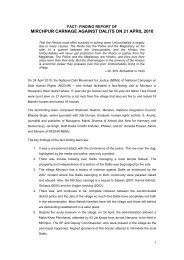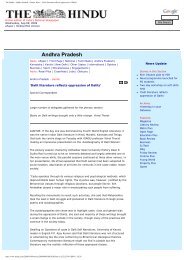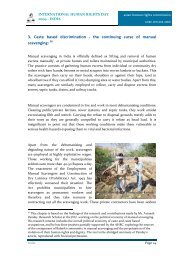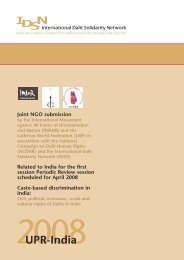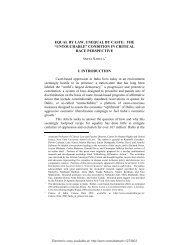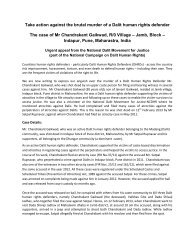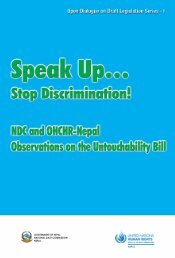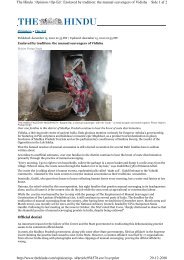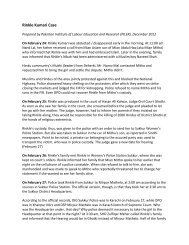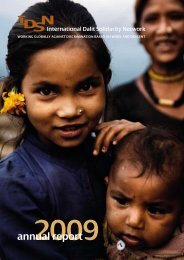A Global Alliance Against Forced Labour - International Labour ...
A Global Alliance Against Forced Labour - International Labour ...
A Global Alliance Against Forced Labour - International Labour ...
You also want an ePaper? Increase the reach of your titles
YUMPU automatically turns print PDFs into web optimized ePapers that Google loves.
A GLOBAL ALLIANCE AGAINST FORCED LABOURwith a legacy of slavery and slavery-like practices. Aprerequisite for effective action against often complexpatterns of forced labour in the African continentwill be the involvement of traditional leadershipstructures in the formulation of action plans and newlegislation.398. In South Asia, action against bonded laboursystems needs to be accorded yet higher priority bynational governments, and by the development anddonor community. Innovative research programmeshave shed much light on the nature and causes ofthe problem, the sectors involved, and the strategiesneeded for effective action against bonded labour.It has become clear that Asian bonded labour canonly be eradicated through a judicious mix of lawenforcement, more equitable land and labour markets,community empowerment and organization,and improved access by the extreme poor to creditand other financial services. The correlation betweenbonded labour systems and extreme povertyhas also been amply attested, suggesting that poorand vulnerable families can have no realistic hope ofextricating themselves from the poverty trap whilebonded labour systems survive. When several millionsare affected, it is an economic as well as a moralimperative that development agencies, which basetheir strategies on poverty targeting and the eradicationof extreme poverty, should single out thesebonded labour systems for priority attention by governmentat all levels.399. In Latin America, recent ILO research hasconfirmed earlier perceptions that indigenous peoplesare particularly vulnerable to forced labour situations,above all in remote regions. In line with theprinciples of the ILO’s Indigenous and Tribal PeoplesConvention, 1989 (No. 169), widely ratified in thisregion, this calls not only for the full involvementof representative indigenous organizations in policiesand plans of action against forced labour, but also forthe targeting of poverty reduction programmes andresources at those areas where the incidence of forcedlabour has been widely documented. In cases whereindigenous peoples migrate from home communitiesto other areas of forced labour incidence, such programmescan be targeted at areas of origin as well asdestination. They should strengthen the capacity ofindigenous peoples to negotiate improved conditionsof recruitment and transport, as well as better livingand working conditions, and effective inspection ofthese, at the place of destination. The work alreadyunder way by the international financial institutions,which are giving increasing attention to poverty reductionand development for indigenous peoples intheir overall lending programmes, should be intensifiedin coordination with the ILO.<strong>Forced</strong> labour, migration and trafficking400. There are now several international, regionaland national action plans against trafficking. Themain issue for this Report is how – following the approachof the EU Experts Group on Trafficking inHuman Beings and others – value can be added toglobal action against trafficking by addressing it froma forced labour perspective.401. National action against trafficking appearsto have been most comprehensive when labour ministriesand institutions have been involved in antitraffickinglaws and policies, and in the inter-agencytask forces established to coordinate action againsttrafficking. This has facilitated a balanced and integratedapproach, combining law enforcement,victim identification and protection, prevention andrehabilitation. The Action Plan should continue toemphasize the labour dimensions of trafficking ensuring,first, that national laws and policies on thesubject give full attention to the forced labour outcomesand, second, that capacity building for nationalinstitutions involves employers’ and workers’organizations, labour courts, labour inspection servicesand employment agencies, as well as the policeand other agencies responsible for the enforcementof criminal justice.402. With the entry into force and already extensiveratification of the Trafficking Protocol, animportant process of law reform is now under wayin many countries. All countries should includeprovisions against trafficking and its forced labouroutcomes in their criminal laws. In doing so, theyshould ensure that immigration and other administrativelaws are adjusted accordingly, involvinglabour law as well as immigration experts in thedrafting process. And the adoption of new antitraffickinglaws needs to be followed by intensivetraining programmes. Moreover, an essential conditionfor the effective application of these laws isthe establishment of protection mechanisms to encouragevictims to cooperate.403. Until now, the focus of attention has beenvery much on the sending countries, which are expectedto bear the burden of action against trafficking.There is a need for more awareness of theimpact of demand in industrialized destinationcountries. Finally, the significant incidence of forcedlabour exploitation of irregular migrants in destinationcountries points to the urgent need for improvedand more rational migration management. Bilateralmigration agreements are one solution. In 2004, the<strong>International</strong> <strong>Labour</strong> Conference reached consensuson the need to develop a multilateral framework forimproved migration management. 30 Sending countriesneed a strengthened capacity to negotiate suchagreements. Other preventive measures include30. Conclusions on a fair deal for migrant workers in a global economy, in ILO: Provisional Record No. 22, <strong>International</strong> <strong>Labour</strong> Conference,92nd Session, Geneva, 2004.84



